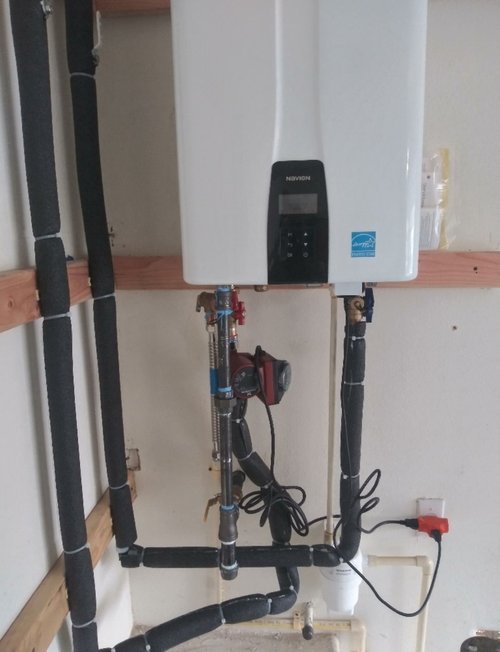A tankless water heater is fast becoming a popular choice for several households. Unlike a traditional water heater, a tankless water heater does not come with a storage tank. Therefore, tankless water heaters are more useful and outperform tank-styled models in various ways. Tankless models are more efficient, require minimal maintenance, take up less space, provide an endless hot water supply, and prove significantly cost-effective in the long run.
A tankless water heater instantly heats water on demand. The heat exchanger heats water as demanded via combustion, and the stainless-steel pipes maintain the water temperature while it flows from the heater to the taps.
When upgrading to a gas-powered tankless water heater, the choice is between a condensing and a non-condensing water heater. This post discusses both options in detail to ensure the right choice:
CONDENSING TANKLESS WATER HEATER
A condensing tankless water heater is a closed system. It reuses or recycles the excess heat it produces to preheat the incoming water instead of releasing the exhaust gasses outside through a venting system. A condensing water heater has a second heat exchanger along with the primary one to loop back and reuse the existing heat. They vent the vapor when it no longer remains useful for heating purposes.
As the incoming water is a little warm, the primary heat exchanger uses less energy and burns less fuel for heating water. The stored excess condensate needs to be neutralized before it is drained.
PROS
A condensing water heater does not require an elaborate ventilation system or expensive piping as the steam it releases is not that hot, and a standard PVC pipe is sufficient for venting. In addition, the condensing tankless water heaters are 90% to 98% energy efficient.
CONS
Condensing water heaters cost almost double their non-condensing counterparts. They also require more maintenance.
NON-CONDENSING TANKLESS WATER HEATER
Most gas-powered tankless water heaters are non-condensing, meaning they do not produce condensation. Instead, they expel the very hot (over 300-degree F) and corrosive exhaust gasses directly into the atmosphere to cool down using a durable and corrosion and heat-resistant ventilation system instead of recycling it. Non-condensing heaters only have a single heat exchanger.
PROS
Most homeowners often choose non-condensing tankless water heater systems while switching from the traditional tank model since it allows them to take advantage of the existing ventilation system. They are also cheaper than their condensing counterparts, have lower installation costs, and use simple technology that reduces maintenance requirements.
CONS
Non-condensing water heaters are about 80% energy efficient, and 20% of heat gets wasted. If the current ventilation system is old or made of inferior materials, the investment required to install durable piping that can sustain the high temperature and corrosion is significantly higher.
CONDENSING VS. NON-CONDENSING TANKLESS WATER HEATERS
Both condensing and non-condensing tankless water heaters are durable, long-lasting, and reliable when properly maintained. Although condensing water heaters are expensive and require higher maintenance than non-condensing tankless water heaters, they are more efficient, reduce wastage, and have a lower venting cost and carbon footprint.
Contact a local water heater expert who will understand the household’s heating needs and suggest the home’s most suitable tankless water heater system.
Water Heater Pros provides water heater installation and replacement services for Las Vegas and surrounding area residents and businesses. Our expert technicians install both traditional and tankless water heaters for homes and other buildings with gas or electric service. We offer the highest quality installers for efficient, versatile water heaters such as Rheem. Ruud, high-efficiency tankless Navien units, and more. Ask about our installation specials.

